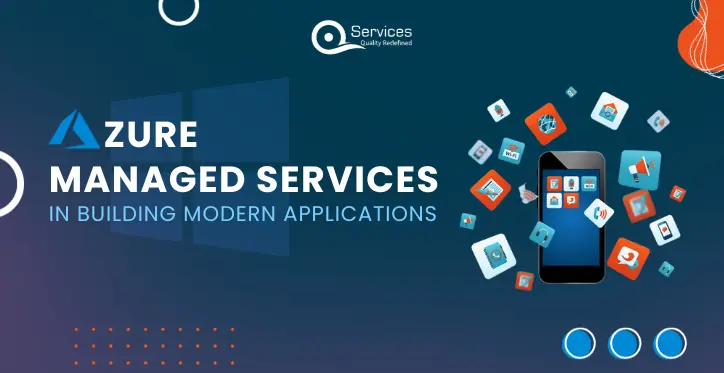Home » Azure Managed Services in Building Modern Applications

The move towards modern applications is like experiencing a new kind of mobility. Unlike older types of applications, modern ones break free from big, rigid systems. They’re like a handy toolkit for companies with different goals. They help employees work better, make customers satisfied, and let developers release software faster. Modern applications become significant because they can connect to the internet, physical devices, or both. They also work together with other apps, forming a group of similar tools.
Modern applications are also good for a company’s cost management. By using applications based on the internet, companies can avoid spending a lot of money on fixed computer systems. This flexibility is crucial in today’s world, where technology is always changing, and businesses need to be quick on their feet.
So, what makes these applications more significant? They’re designed with users in mind, keeping things simple and easy to understand. They also look ahead to the future, making sure they stay useful even as things change. As companies face the challenges of the digital age, modern applications shine as symbols of innovation, where flexibility, adaptability, and being open to everyone come together to shape the future of business success.
In this blog post, we’ll discuss how important Azure Managed Services are to creating and optimizing modern apps and creating the foundation for a seamless shift in the cloud computing industry from efficiency to innovation.
Traditional applications often come with hefty maintenance costs tied to fixed computer systems. In contrast, modern applications, leveraging internet-based infrastructure, offer a cost-effective alternative. This financial flexibility is crucial in a world where businesses need to stay nimble in the face of changing technology. Additionally, traditional applications struggle with complex development processes, diverting valuable time and resources to manage intricate infrastructures. Modern applications, exemplified by platforms like Azure, simplify development cycles, letting teams focus on essential tasks instead of grappling with cumbersome infrastructure management.
Modern applications address the limitations inherent in traditional counterparts. They excel in agility, facilitating faster development times and allowing teams to concentrate on innovation rather than being bogged down by complex infrastructure maintenance. The interconnected nature of modern applications fosters collaboration, a stark contrast to the isolated silos often found in traditional setups.
Moreover, modern applications eliminate the need for substantial investments in fixed computer systems, making them a financially savvy choice. Security concerns, a perpetual issue for traditional applications, are robustly addressed by modern applications integrated with services like Azure Managed Services. These contemporary solutions embed security features, including compliance controls and encryption mechanisms, ensuring the safeguarding of sensitive data and adherence to regulatory standards. In essence, modern applications represent a practical shift, offering a forward-looking approach that resolves challenges faced by traditional applications, propelling businesses into a future of innovation, efficiency, and cost-effectiveness.
Get free Consultation and let us know your project idea to turn into an amazing digital product.
A group of cloud services designed specifically to support Azure systems is known as Azure managed services. They let IT workers manage infrastructure, security, and apps within a business. Utilizing these services can help you get the most out of Microsoft Azure products. Beyond basic maintenance, Azure managed services actively help companies optimize and fully manage their Azure deployments. From first advice to continuous Azure environment monitoring, these service providers guarantee smooth operations that significantly enhance your company and propel organizations toward success.
In the financial year 2023, Microsoft Azure had a big 26% boost in revenue in the last quarter, showing that a lot of people trust and like using it for cloud computing. Azure is like a strong foundation from Microsoft that helps make different solutions that can change based on what you need, like dealing with data or making apps.
The increase in revenue happened because Azure’s services bring clear advantages for businesses. People using Azure in their businesses see benefits like faster development times, so the team can focus on important stuff instead of dealing with complicated infrastructure. Azure’s ability to adjust to changing needs without needing a person to step in also helps businesses a lot. Also, Azure’s built-in rules and safety features ease the workload for the team and make the workplace more secure. Basically, Azure’s big revenue boost shows it’s good at giving affordable, reliable, and worldwide accessible solutions that help businesses do well in the digital world. As an Azure managed services provider, its comprehensive offerings play a pivotal role in ensuring seamless operations and optimizing Azure deployments for enhanced organizational success.
Azure App Service is a powerful platform provided by Microsoft, designed to elevate the capabilities of web applications. It simplifies the process of building, hosting, and scaling web apps, offering a comprehensive solution for developers and businesses seeking efficient and streamlined application development.
These services are equipped with a range of features that make the development and management of web applications a breeze. Developers can take advantage of integrated tools and services for building applications rapidly. Hosting is made simple with Azure’s robust infrastructure, ensuring reliability and optimal performance. Scaling web apps to meet changing demands is seamless, thanks to the scalability features inherent in Azure App Service.
One of the standout features of Azure App Service is its versatility in supporting multiple programming languages. Whether you’re comfortable with popular languages like Java, .NET, or Node.js, Azure App Service has you covered. This flexibility empowers developers, making the development process smoother and more efficient. As an integral part of Azure managed applications, Azure App Service contributes to a comprehensive ecosystem, ensuring the seamless functioning and optimization of applications deployed on the Azure platform.

Azure Managed Services play a crucial role in efficiently handling and optimizing infrastructure. This involves the management of servers, storage, and networking components to ensure a seamless and reliable foundation for applications.
They simplify and expedite infrastructure management tasks. This includes automated provisioning, scaling, and monitoring, reducing the manual workload on development teams.
Azure managed services are equipped with robust security features. These include built-in compliance controls, encryption mechanisms, and threat detection tools to fortify the infrastructure against potential threats and vulnerabilities.
These services contribute to modern application development by providing a secure environment. This is crucial for safeguarding sensitive data and ensuring compliance with regulatory standards.
They extend their capabilities to streamline the management of applications within a business. This involves optimizing application performance, automating deployment processes, and ensuring continuous availability. Some of the examples of application management tasks handled by Microsoft Azure Managed Services include automated updates, patching, and scaling based on demand. These services allow development teams to focus on enhancing application features rather than dealing with routine maintenance.
Azure App Service, a key component of Microsoft’s cloud computing offering, significantly accelerates application development. By leveraging integrated tools and services, developers can streamline tasks like deployment and scaling, allowing for a more efficient and collaborative workflow.
Because of cloud computing services like Azure, developers benefit from integrated tools that simplify common development tasks.
Azure App Service’s reliability and performance are underpinned by Azure’s robust infrastructure. This ensures reliable hosting, consistent uptime, and optimal application performance, translating to positive impacts on user satisfaction and overall business operations.
Azure App Service stands out for its versatility in supporting various programming languages, aligning with the diverse preferences and expertise of developers. This flexibility caters to developers across different industries, from startups to global enterprises. Azure cloud managed services, not only support various programming languages but also offer Software as a Service (SaaS), Platform as a Service (PaaS), and Infrastructure as a Service (IaaS). This versatility empowers enterprises with integrated cloud services, tools, and structures for a comprehensive cloud journey.
The cloud-native development trend is in line with Azure Managed Services. Azure’s package of managed services makes it easier for businesses to design and implement apps that make the most of cloud environments as they move toward cloud-native strategies.
Using Microsoft Azure Managed Services for cloud-native development has many benefits. It makes it possible to develop apps that are quickly adjustable to shifting business requirements and that are scalable and versatile. Continuous integration/continuous deployment (CI/CD) pipelines, microservices, and containerization accelerate development and promote innovation.
In the field of serverless architecture, Azure Functions is essential. With Azure Functions, developers can concentrate on creating code that is triggered by events rather than worrying about maintaining servers or infrastructure. This fits well with the serverless computing movement, in which developers focus only on writing and the cloud provider handles all operational details.
Azure Functions is a prime example of serverless computing, which enhances contemporary application architecture with its pay-as-you-go model and demand-driven dynamic scalability. This method improves cost effectiveness because companies only pay for the resources used when the code is executed. Moreover, it encourages quicker development cycles and a more adaptable and flexible development environment.
Organizations are actively pursuing a hybrid cloud approach, balancing on-premises and cloud solutions. Azure Managed Services fit smoothly into hybrid environments because they’re flexible, take data sovereignty into account, and help optimize existing infrastructure investments.
The integration of artificial intelligence (AI) and machine learning (ML) into Azure Managed Services is gaining momentum. Businesses leverage Azure’s robust ML capabilities to enhance decision-making processes, optimize operations, and extract valuable insights from their data.
In response to the escalating importance of cybersecurity, businesses prioritize the integration of Azure’s managed security services. Azure’s suite of tools ensures data security, robust identity management, and compliance with industry regulations, making it the preferred choice for security-conscious enterprises.
The trend toward serverless computing is intensifying, enabling organizations to focus on coding without managing the underlying infrastructure. Azure’s serverless offerings, such as Azure Functions and Logic Apps, play a pivotal role in this shift, delivering scalable and cost-effective solutions.
With the expanding Internet of Things (IoT) landscape, there’s a growing demand for edge computing solutions. Azure’s managed services align with this trend, providing capabilities for edge computing. This empowers organizations to process data closer to the source, reducing latency and enhancing overall performance.
In the pursuit of agility and efficiency, businesses integrate Azure DevOps and CI/CD pipelines into their workflows. Microsoft Azure cloud managed services facilitate these practices, automating and streamlining application development, testing, and deployment.
Containers play a crucial role in modern application development. Azure Kubernetes Service (AKS) efficiently manages containerized applications in the cloud, providing a scalable solution.
In the face of increasing cloud environment complexity, effective cost management is crucial. Azure’s managed services provide tools to monitor and optimize resource usage, empowering organizations to control expenses while ensuring optimal performance.
Changing to modern applications represent a significant advancement in the way firms’ function, rejecting inflexible systems in favor of adaptable, user-centered solutions. Azure Managed IT Services, which provide a customized set of web tools for effectively managing applications, security, and infrastructure in enterprises, are essential to this shift. Microsoft Azure’s revenue growth is a testament to the public’s trust in the company and to its ability to deliver solutions that are accessible, dependable, and reasonably priced for businesses navigating the challenges of the digital age. Because of Azure’s flexibility and features like its support for several programming languages, developers can easily construct, host, and grow web applications. Azure Managed Services smoothly align with emerging trends in the cloud computing space, like serverless computing, cloud-native development, and the combination of AI and ML. This establishes Azure as a pillar for security, innovation, and operational effectiveness in the ever-changing world of modern application development.

Content writer

Founder and CEO

Chief Sales Officer
